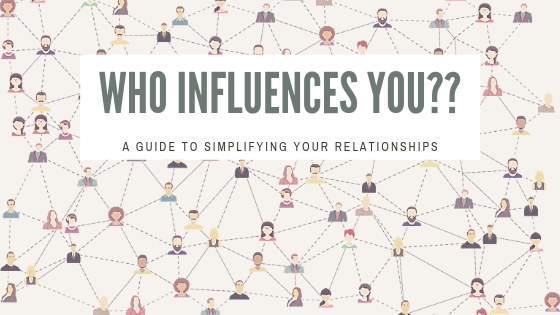
Simplifying your relationships increases the quality of your life and allows you to be your best self. Personal connections are an important aspect of who you are. They greatly impact the things you do, when, and how you do them. It is important to me to be intentional about who I let into my space and to stay aware of how they are influencing me. I’ve found this to be the first step in simplifying the relational component of my life. Relationships can be a huge area of unnecessary stress when we allow them to gain excessive control over our actions and thoughts. They can also be some of the most rewarding parts of our lives. It’s important to keep it simple. Relationships can profuse joy and abundant life when you give them the proper priority and respect. The most effective ways to simplify complicated relationships include learning how to…
- communicate effectively,
- pick your battles; and
- even let go of those people sapping your life-flow.
Acknowledging your influences
It is important to acknowledge those people you are connected to and the nature of your interactions. Anyone you have regular contact with has the potential to effect you, the ideas around you, and your physical environment. Those you spend the most time with often become those you adapt to be most like. Survey your time and situations for the people you interact with and think about how they might be changing the climate of your life. Simplifying your life and living to your fullest potential requires you to acknowledge these factors and take responsibility.
Ecology: Life affecting life
Ecology is the word used in science to define the study of organisms and how they interact with one another and with their environment. Brofenbrenner was an American psychologist who studied human development. He is known for his “ecological theories”, which means his ideas about how we interact with the people in our lives and the environment we live in, as well as how those things act on us. His model suggests that these are more intimately connected than we consider and have a greater impact on us than we admit.
Briefly, his model includes our daily encounters that effect us directly such as close family, co-workers, and friends. Beyond that you have your extended family, church and community members, and neighbors. These people all effect you but less directly as they might see you face-to-face less often, if at all, but they still change the dynamic of your community with or without a direct relationship with you. A step further out might include those people on your city, parks, and community center boards, local philanthropists, and your district government. These people and groups make decisions about how your community is structured and used. You might not even know their names and yet they can leave a substantial impression on your everyday life. You are even effected by your country’s political system, culture and subcultures, and the values and norms established by your society.
Be Intentional
Knowledge is power. Simplifying your relationships starts when you know who is effecting you. You then have the ability and (I believe) the responsibility to be intentional about who you are becoming at the hands of those around you. Surround yourself, as much as you can, with those who build you up, make you stronger, and whom you can strengthen, as well. Everything in life is a choice. Every choice comes with consequences. The great thing about freedom is, you get to make the decisions about which consequences are most life-giving to you. I hope that you have the opportunity and courage to be intentional about the relationships in your life.
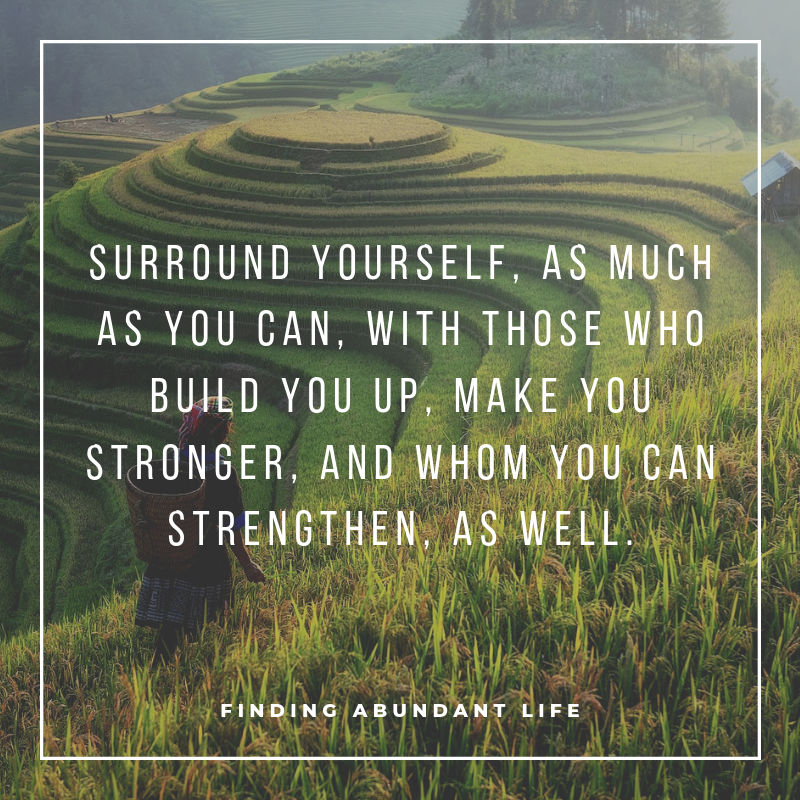
Simplifying your relationships
As long as we are here in this human state there will always be disconnect in even the best relationships. That doesn’t mean that the relationship is bad for you or that you’re in a sinking ship. When I first started minimizing the physical clutter in my life, I found myself thinking about how my relationships with a couple of specific individuals would benefit from the same kind of scouring. In a way, this was the beginning of my perspective on whole life minimalism. There are a lot of things that we hold on to and allow to clutter up our relationships. I’ve been learning a lot about the benefits of letting some of those things go. You can find the same clarity by simplifying your relationships back down to the people and the connection.
Who ARE the people
The first thing I did when trying to simplify my relationships was consider the people I have in my life and the role they were playing. I didn’t realize at the time how helpful this was going to be. Moving forward, it helped to know who and why certain people were in my life. Found that there were several I hold onto simply for the sake of their group affiliation or social power. (Think about people you might hold on to because you’re “supposed to”. You might even bend over backwards just to… keep their good favor?) I’m not sure that that is necessarily bad, but it has definitely been a helpful thing to acknowledge when allocating and prioritizing how I use my time and energy.
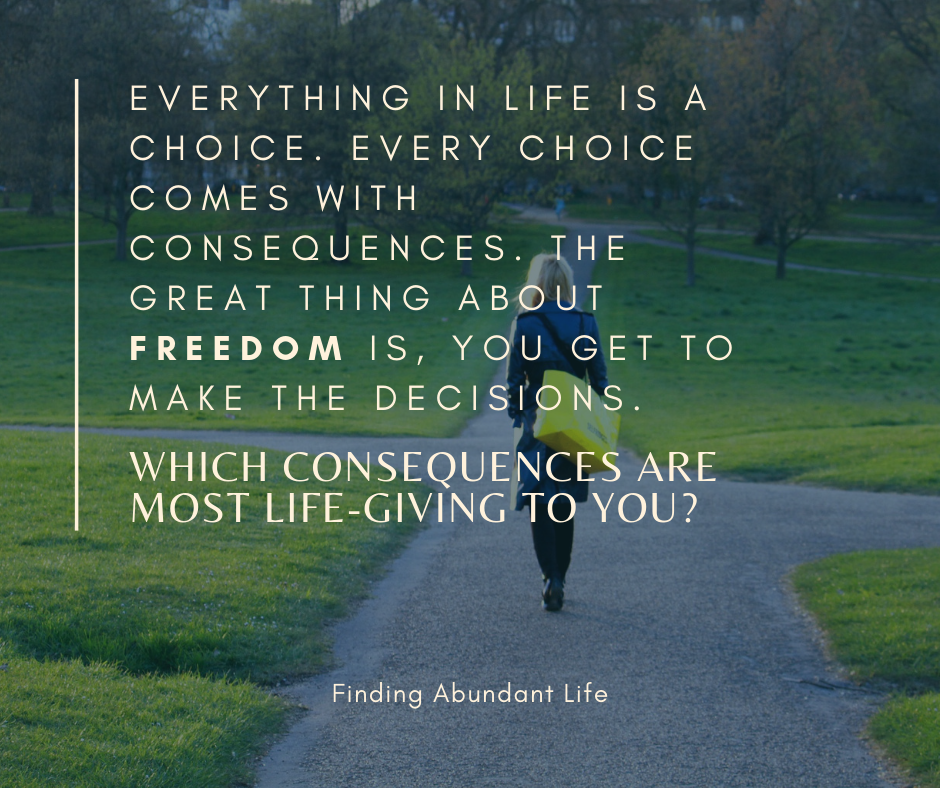
Once you know who is around you and why you can start working on the relationships that are valuable to you, but might also be adding stress and drama. It’s a great idea and a huge step forward if you already know the source of the problem. But sometimes you don’t know. Sometimes it can feel like the responsibility is all on them. My mom used to be infamous for asking someone complaining about a sibling, “who can you control?” That’s a great reminder. Regardless of who is to blame, you can only control yourself. So, the actionable steps in simplifying your relationships are all focused on what YOU can do to work on things.
Effective communication
I think we can always be improving our communication skills and I am by no means a master communicator myself. But, I can often recognize what works and what doesn’t. Simplifying your relationships might come down entirely to communication errors on one or both sides. When we lack good communication in our lives we can fail to help our valuable people feel appreciated, we complicate our mutual goals, and even create problems between us that wouldn’t have otherwise been there. I have a full series of posts I’d like to write on effective communication, so I’ll try to keep it brief here.
It all seems to start with listening. When people feel heard they feel valued and respected. In turn, the are more likely to treat you well, cooperate towards mutual benefit, and build the relationship up. Listening involves giving them time to talk without interruption. It also includes being aware of the nonverbal cues they are giving you. Notice the emotions they are expressing when they talk so that you can respond appropriately. Empathize with them to better understand. Note the difference between empathy and sympathy though. Don’t feel bad for them, try to “walk in their shoes”. What was their experience like that led them to the thought they are sharing? Listening fully is vital to good communication.
Simplifying your relationships boils down pretty easily. Ultimately, everyone wants to:
- be respected,
- make a unique difference,
- be valued for that difference,
- be connected to people (especially if those people help them fulfill the last three)
The way that you respond in communication can either add to and build up who they are or take away from them. The degree to which you effect them varies. If you can find a way to live into any of those desires, they are going to be more likely to respond in kind. That doesn’t mean you have to lie, agree with them, or stroke their ego. You can respectfully say most things. This is the backbone of effective communication. There’s a lot more to it than that though. I will have more posts on the subject, so if you’re especially interested stay tuned.
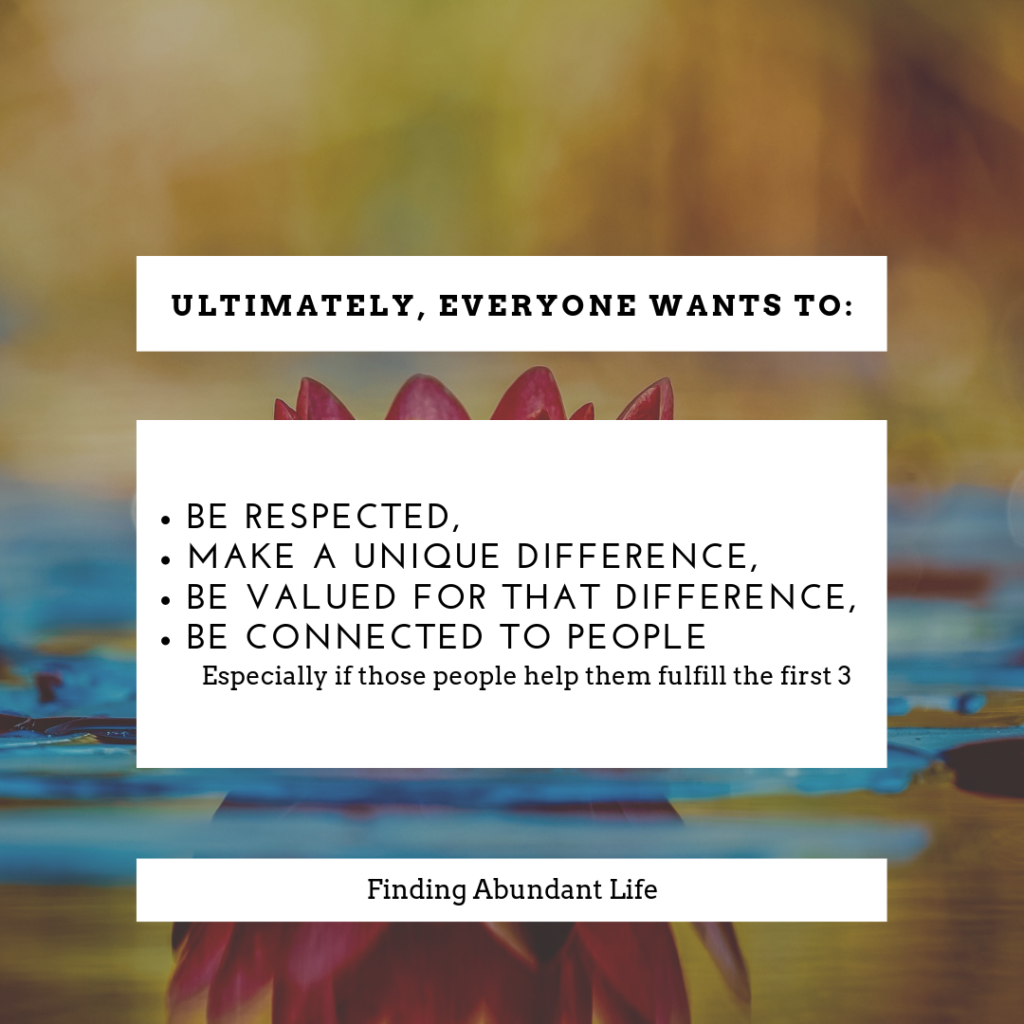
When to let it go
Another area for evaluation that can really simplify your relationships is your ability to “pick your battles”, as my mom always said (she’s a wise lady). The idea is that you only have so much energy. Fight the battles that are important in advancing your goal. This is great advice for many areas of life. But in this context it means that some things will only damage the relationship to argue. Know what is important to you and what is worth letting go for the sake of the person you care about.
An Example
My husband puts things away in a different place every single time he unloads the dishwasher… I am an organized person who would like the spatulas sorted first by material and then by size. He doesn’t even put them in the same drawer every time. At first this drove me crazy! But, I talked to him using effective communication and discovered that he doesn’t do it to bother me, He just can’t remember where anything goes half the time. I still feel like this could be remedied in the future and it might be. But, for now, that battle isn’t worth fighting. I love my husband more than I love order. His behavior change would really only satisfy my particularness, which isn’t all that important in the grand scheme of our relationship, so why complicate a good thing? I let it go.
Are they worth the fight?
However, that’s not to say everything is worth letting go. I am a people pleaser and have struggled my whole life with jumping through hoops to make people happy with me. This is an area where acknowledging why someone is in my life has been extremely helpful. I realized that I collected people who needed me. Filling my life with relationships that were not mutual was adding excess and decreasing my quality of living. I broke my back to be helpful to people that didn’t really care about me. They were less concerned about our relationship than what I could do for them. It has been a long road to knowing how to let go of the takers and one I’m not finished walking. Knowing a good relationship from a toxic one is hard. Even harder is picking out a struggling relationship with a beautiful core of potential.
12 Signs of Toxic Behavior
So how do you assess your relationships and decide when to walk away from the fight? In the context of toxic relationships, “red flag behaviors” refers to behavioral patterns that are cause to consider possible underlying problems between two or more people and potentially toxic relationships. There is an amazing article discussing the markers of toxic behavior. These can include, but are not limited to:
- Lying
- Manipulation
- Trivializing things important to the other person
- Inability to address problems
- Inability/refusal to apologize for wrong-doing
- Spiteful behavior after conflict
- Not willing to admit mistakes
- Constantly blaming others
- Treating others with aggression
- Verbally putting down others
- Ignoring the other’s requests and needs
- Going out of their way to cause the other grief
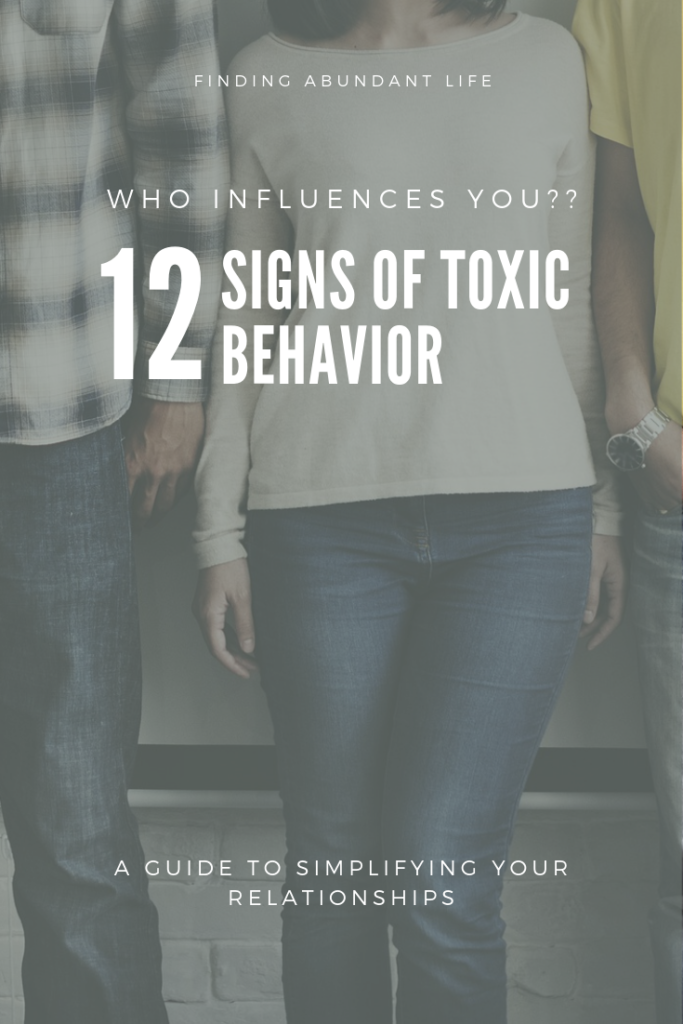
Everything is a spectrum
Most psychologists agree that many if not all areas of mental health are on a spectrum. Rarely are things so binary as “having” or “not having” an issue. It is probably more adequate to view it on a scale of “exhibiting few problematic behaviors” to “exhibiting many problematic behaviors”. There are times in everyone’s life where we don’t respond the way we should. Having a particularly stressful day, dealing with trauma, or just plain “hangry” can bring out the worst in us. So, just because someone exhibits problematic behavior doesn’t mean the they are a bad person or the relationship is ruined. Lots of good people behave poorly sometimes. There are many red flag behaviors to watch for that can help you decide when a relationship is predominately toxic. When those behaviors start causing problems in other areas of your life and your mental health you should consider distancing yourself.
The line between a problem you can work through together, something you can overcome with counseling, and regular abusive behavior can actually be hard to distinguish. If you are feeling like you are in an abusive relationship and can’t get out, seek professional help! Many people live with abuse for far too long not being able to distinguish that line.
Be mindful and take care fo yourself
But ultimately, be mindful about the relationships you choose to participate in on a regular basis and how they impact the flow of your life. I would urge you to look at the relationships that make you feel less, steal your joy, and diminish the abundance of your life. Look for the reasons behind the conflict. Wherever possible find the things you’re responsible for in the problem and the ways you can be part of the solution.
That doesn’t mean make excuses or accept someone else’s responsibility for the problem! But, know that once you have done all you can do to make amends they might continue to be toxic in your space. If that is the case, depending on how close you are and how important the relationship is to you, you might consider seeking help from a licensed specialist. Otherwise think about distancing yourself from them and the situations in which they are impacting you.
Simplifying your relationships: Review
Hopefully, this post wasn’t too long for you. It is an important topic to me and one I feel is deserving of thorough discussion. In review:
- Acknowledge the relationships you are in and the people who impact you
- When you have relationships that are making excess in your life there are things you can do to simplify
- Take responsibility and be part of the solution
- Many things can be fixed with good communication (check out my download…)
- Sometimes its best to just let go of trivial conflicts
- Recognize that even good relationships can be a struggle
- Sometimes people are just toxic, learn to recognize when to walk away
- If they are causing trouble you can’t seem to fix (and you still love them) SEEK HELP
I really care about you guys and I hope this helps brings as much joy and abundant life into your journey as it has brought to mine. Please, comment. Let me know what you think. What are some ways that you have found really helps solve conflict? Have you had to distance yourself from toxic people? What was that like for you? I would love to start some open public discussions about the things that matter, but also feel free to email me!